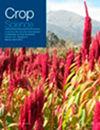检测环境趋势,重新思考大豆品种测试计划
IF 2
3区 农林科学
Q2 AGRONOMY
引用次数: 0
摘要
本文章由计算机程序翻译,如有差异,请以英文原文为准。
Detecting environmental trends to rethink soybean variety testing programs
Variety testing programs (VTPs) use multi‐environment trials (MET) to evaluate and report the performance of commercially available and pre‐commercial soybean (Glycine max L. Merr.) varieties targeting a specific set of environments. Adequate modeling of the environmental variability and genotype–environment interactions (G × E) within the VTP would help farmers and seed companies decide which variety to choose or recommend. We propose an approach to characterize environments using the soybean data from the University of Missouri VTP. We modeled an environmental trend (EnvT) based on the phenotypic mean performance and the observed phenotype in each environment. The environments were classified into four different EnvT environment types, and soil and climate data were used as predictors of the EnvT through eXtreme Gradient Boosting (XGBoost) model. Temperature on late vegetative and flowering, soil‐saturated hydraulic conductivity, and silt content were key drivers of EnvT. The approach identified overrepresented environments (62%) and increased the ratio between variety and G × E variance. A simulation case study verified that the random removal of overrepresented sites from the dataset quickly degraded G × E analysis, implying that increasing the number of underrepresented sites is recommended. Our results demonstrate that environmental characterization is essential for optimizing resource allocation within VTP, thereby supporting the end goal of aiding farmers to utilize the best varieties for their production environment.
求助全文
通过发布文献求助,成功后即可免费获取论文全文。
去求助
来源期刊

Crop Science
农林科学-农艺学
CiteScore
4.50
自引率
8.70%
发文量
197
审稿时长
3 months
期刊介绍:
Articles in Crop Science are of interest to researchers, policy makers, educators, and practitioners. The scope of articles in Crop Science includes crop breeding and genetics; crop physiology and metabolism; crop ecology, production, and management; seed physiology, production, and technology; turfgrass science; forage and grazing land ecology and management; genomics, molecular genetics, and biotechnology; germplasm collections and their use; and biomedical, health beneficial, and nutritionally enhanced plants. Crop Science publishes thematic collections of articles across its scope and includes topical Review and Interpretation, and Perspectives articles.
 求助内容:
求助内容: 应助结果提醒方式:
应助结果提醒方式:


